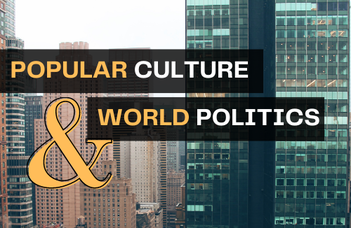From dragons to transformers and the Olympics: popular culture and world politics


The course fee for 1-week courses - that includes tuition fee, accommodation (student residence halls with shared rooms 2-3/ room), meals (breakfast and lunch), local transport and the cost of the leisure time programs - is 470 EUR. All applicants are required to pay 70 EUR (out of this 470) as registration fee within 10 days of submitting their application. The registration fee is non-refundable.
Credits: 3 EC
Our course offers ECTS points, which may be accepted for credit transfer by the participants' home universities. Those who wish to obtain these credits should inquire about the possible transfer at their home institution prior to their enrollment. The International Strategy Office will send a transcript to those who have fulfilled all the necessary course requirements and request one.
Venue: ELTE Faculty of Law, 1053 Budapest, Egyetem tér 1–3. A/8 practice room
Opening Ceremony venue: ELTE Faculty of Law, 1053 Budapest, Egyetem tér 1–3., Aula Magna (Monday, 10:00)
Application:
For students who do not need visa to travel to Hungary: https://www.elte.hu/en/culture-and-politics-bsu2023
For students who need a visa to travel to Hungary: https://www.elte.hu/en/culture-and-politics-bsu2023-visa
Course description
The goal of this course is to examine and understand the different roles that popular culture (mass consumption cultural products: movies, sports, music, literature, manga etc.) can play in the practice and analysis of world politics. The course explores this relationship in three ways. First, it considers popular culture as a reflection of political and societal processes, as well as national identities in the context of global politics. How do war movies reflect historical trauma? How do sports competitions instantiate clashing national identities? How is the practice of great power diplomacy presented in mass media? Second, the course explores ways in which different actors (the State, domestic and transnational non-state actors) use popular culture for political purposes. They are, however, at the same time, influenced by pre-existing popular culture products. Where does the close cooperation between the US military and Hollywood originate? How does China seek to promote itself as an emerging world power in its state-funded media products? In other words, the course treats popular culture as an important element in power relations among different actors in the domestic, international and transnational arenas. Third, the course will investigate the use of popular culture in analyzing and understanding international politics. Popcultural artefacts can namely help us imagine fictional scenarios that are analogous with real phenomena, while keeping a healthy distance from current politics, for instance zombie movies as an analogy for global pandemics. They can equally aid us in introducing abstract concepts of International Relations Theory, and use them to explore fictional worlds like that of Star Wars or Game of Thrones. Understanding the role of popular culture in the context of global politics invites a complex inter-disciplinary approach. Students will therefore also be exposed to insights from Social Psychology, Communication and Culture Studies, and first and foremost, International Relations Theory.
Prerequisites for taking the course
The course does not have any specific requirements; however, it assumes a general openness to world politics and popular culture.
Instructors
András Szalai, associate professor, ELTE Faculty of Social Sciences, Institute of Political and International Studies, Department of International Relations and European Studies
Áron Tábor, lecturer, ELTE Faculty of Social Sciences, Institute of Political and International Studies, Department of International Relations and European Studies
Schedule of lectures and seminars
Introduction: Popular culture and politics (András Szalai)
Introduction: Theories and methods in International Relations (Áron Tábor)
Popular geopolitics: how does popular culture see great power politics? (András Szalai)
Popular culture as a form of soft power (Hollywood, Chinese soft power) (Áron Tábor)
Banal nationalism, identity and popular culture (Áron Tábor)
War, nationalism, historical trauma and the movies (András Szalai)
Cold War, nuclear deterrence theory and Dr. Strangelove (András Szalai)
Video games and world politics (András Szalai)
Science fiction from the perspective of International Relations (András Szalai)
Political analysis of fictional worlds: Game of Thrones, Lord of the Rings etc. (András Szalai)
Fire and fury: how memes and Twitter have changed (public) diplomacy (Áron Tábor)
All the President’s men: the American presidency in movies and in television (Áron Tábor)
Sports and popular music in world politics (Áron Tábor)
Conclusion (Áron Tábor)
